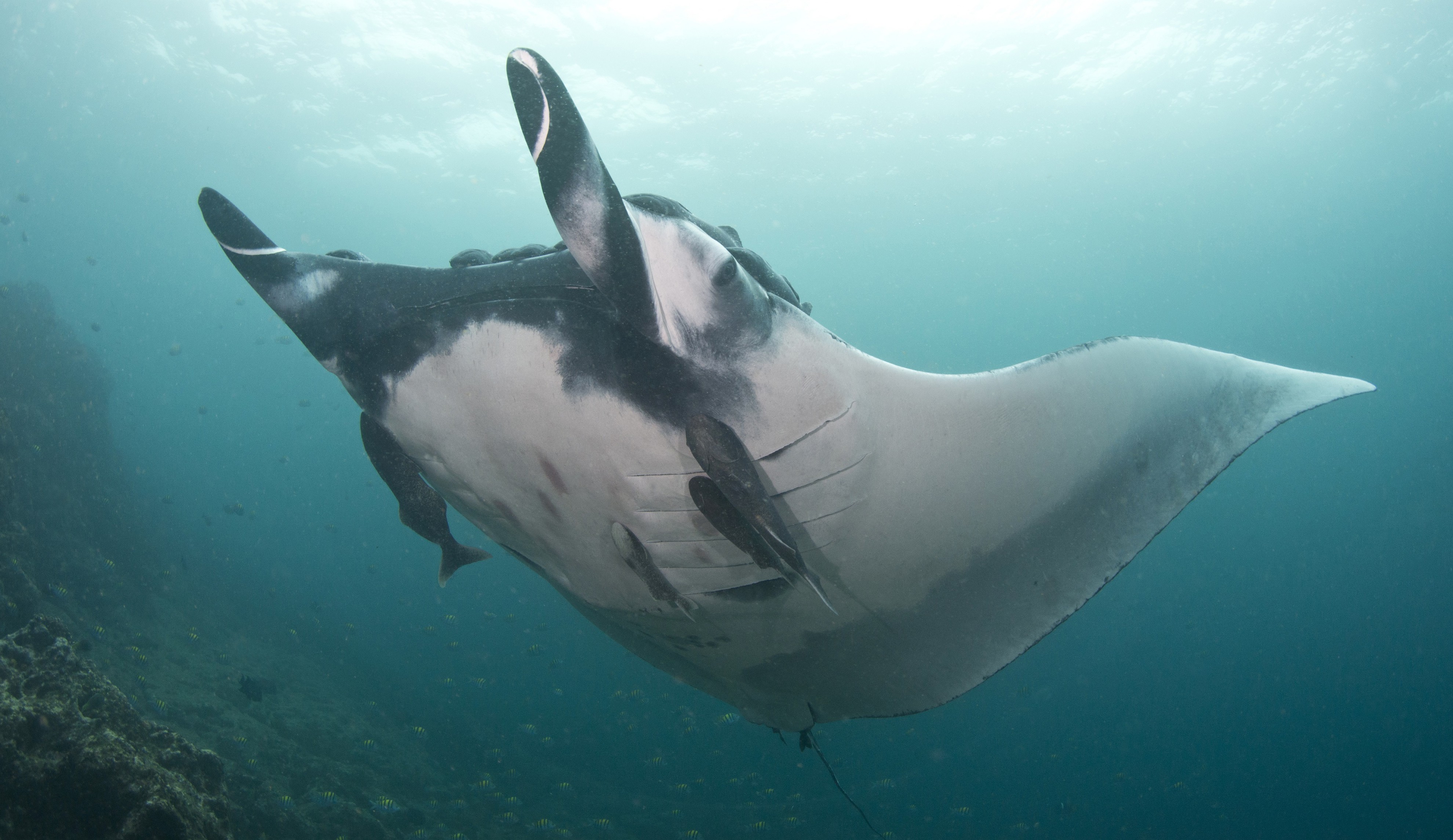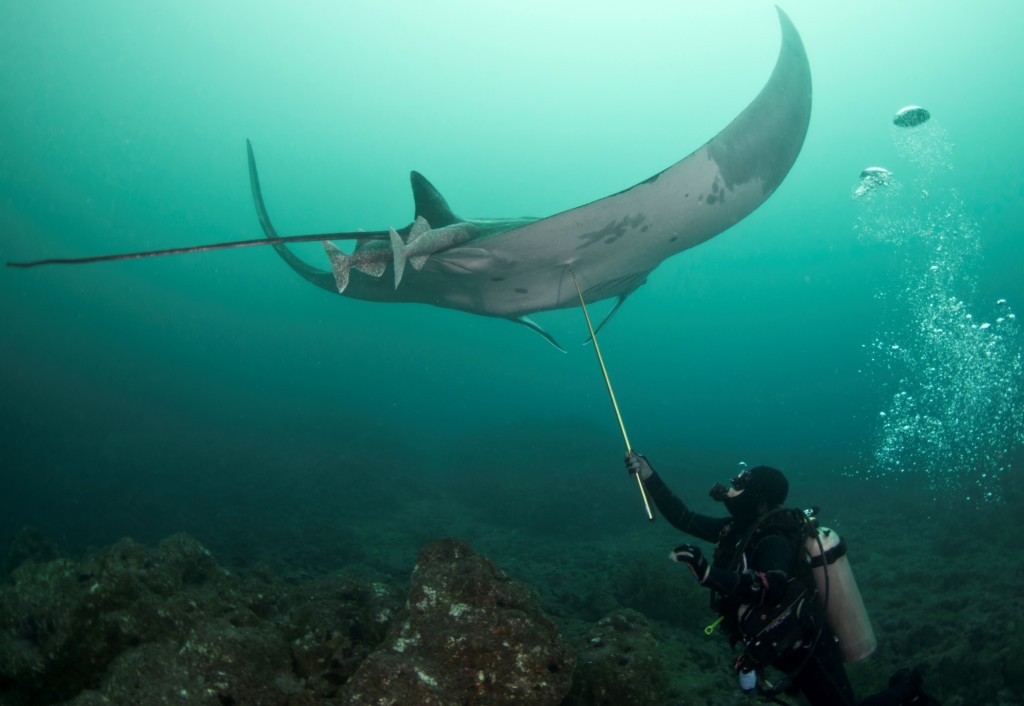Marine Life & Conservation
Giant manta rays found to be predators of the deep ocean

A new scientific study by the Marine Megafauna Foundation (MMF), the University of Queensland (UQ) and Proyecto Mantas Ecuador has been published in Royal Society Open Science today, providing novel insights into the food sources of giant manta rays found in the eastern equatorial Pacific.
The giant manta ray (Manta birostris) is a filter-feeding and highly migratory marine species found in tropical and temperate waters worldwide. The large majority of existing information about the species’ diet is based on observational data limited to feeding activities at the sea surface during daylight at well-known aggregation sites.
This new study focused on Isla de la Plata, an island off Ecuador, which seasonally hosts the largest known aggregation of giant manta rays in the world. Manta ray muscle and surface zooplankton were examined through stable isotope analysis, and revealed that the species’ dietary intake largely comes from the mesopelagic zone (200 to 1,000 meters below the ocean surface) rather than from surface zooplankton as previously thought.
MMF’s manta ray researcher Katherine Burgess, who authored this study as part of her PhD project at the University of Queensland, commented: “Manta rays are one of the most iconic marine animals, yet we still know very little about their feeding habits. The study reports much-needed information on the diet of this elusive species.”

Katherine Burgess taking a tissue sample of a giant manta ray in Ecuador. Copyright: Andrea Marshall
“We studied the giant manta rays’ diet using biochemical tests, such as stable isotope analysis, which work on the ‘you are what you eat’ paradigm. These tests can determine what animals have been eating by examining a piece of tissue from a muscle biopsy from a free-swimming animal,” she added.
Professor Anthony Richardson, a scientist with UQ’s School of Mathematics and Physics and the CSIRO’s Oceans and Atmosphere Flagship, said: “The research found an average 27 per cent of the giant manta rays’ diet comes from surface zooplankton and 73 per cent from mesopelagic sources including fish from 200m to 1,000m below the ocean surface.”
“The deep ocean is the next frontier for open ocean fisheries, and we are only just realizing the potential reliance on this zone by threatened marine megafauna,” he added.
Giant mantas are known to dive to depths of over 1,000 meters making it difficult to study their feeding ecology. To determine the diet of a fish, researchers normally examine its stomach contents. However, this is usually a distressing or lethal procedure and would not be appropriate considering global manta ray populations have been in drastic decline due to anthropogenic threats such as targeted fishing or bycatch, pollution and habitat destruction.
Both species of Manta – the giant manta ray (Manta birostris) and reef manta ray (Manta alfredi) – are listed as ‘vulnerable to extinction’ on the IUCN Red List of Threatened Species. To date, manta rays are formally protected in Ecuador, Peru, New Zealand, the USA (Florida, Hawaii and Flower Garden Banks), Guam, Maldives, Yap, Indonesia, the Philippines and Mexico only. Filling the knowledge gaps on manta ray feeding ecology is crucial for the identification of critical habitats and aggregation sites, which are vital for developing effective conservation measures for these species.
Marine Life & Conservation
Double Bubble for Basking Sharks

 The Shark Trust is excited to announce that, for two more days only, all donations, large or small, will be doubled in the Big Give Green Match Fund!
The Shark Trust is excited to announce that, for two more days only, all donations, large or small, will be doubled in the Big Give Green Match Fund!
Donate to Basking in Nature: Sighting Giants
The Shark Trust is hoping to raise £10k which will be doubled to £20k. This will go towards Basking in Nature: Sighting Giants. And they need YOUR help to reach they’re goal.
The Shark Trust’s citizen science project is to monitor and assess basking sharks through sightings; encouraging data collection, community engagement, and promoting nature accessibility. This initiative aims to enhance health and wellbeing by fostering a deeper connection with British Sharks.
Campaign Aims
- Increase citizen science reporting of Basking Sharks and other shark sightings to help inform shark and ray conservation.
- Provide educational talks about the diverse range of sharks and rays in British waters and accessible identification guides!
- Create engaging and fun information panels on how to ID the amazing sharks and rays we have on our doorstep! These can be used on coastal paths around the Southwest. With activities and information on how you can make a difference for sharks and rays!
- Promote mental wellbeing through increasing time in nature and discovering the wonders beneath the waves!
Donate, and double your impact. Click Here
Marine Life & Conservation
Leading UK-based shark conservation charity, the Shark Trust, is delighted to announce tour operator Diverse Travel as a Corporate Patron

 Corporate Patrons provide a valuable boost to the work of The Shark Trust. The Trust team works globally to safeguard the future of sharks, and their close cousins, the skates and rays, engaging with a global network of scientists, policymakers, conservation professionals, businesses and supporters to further shark conservation.
Corporate Patrons provide a valuable boost to the work of The Shark Trust. The Trust team works globally to safeguard the future of sharks, and their close cousins, the skates and rays, engaging with a global network of scientists, policymakers, conservation professionals, businesses and supporters to further shark conservation.
Specialist tour operator Diverse Travel has operated since 2014 and is committed to offering its guests high quality, sustainable scuba diving holidays worldwide. Working together with the Shark Trust will enable both organisations to widen engagement and encourage divers and snorkellers to actively get involved in shark conservation.
“Sharks are truly at the heart of every diver and at Diverse Travel, we absolutely share that passion. There is nothing like seeing a shark in the wild – it’s a moment that stays with you forever!” says Holly Bredin, Sales & Marketing Manager, Diverse Travel.
“We’re delighted to celebrate our 10th year of business by becoming a Corporate Patron of the Shark Trust. This is an exciting partnership for Diverse and our guests. We will be donating on behalf of every person who books a holiday with us to contribute towards their vital shark conservation initiatives around the world. We will also be working together with the Trust to inspire divers, snorkellers and other travellers to take an active role – at home and abroad – in citizen science projects and other activities.”
Paul Cox, CEO of The Shark Trust, said:
“It’s an exciting partnership and we’re thrilled to be working with Diverse Travel to enable more divers and travellers to get involved with sharks and shark conservation. Sharks face considerable conservation challenges but, through collaboration and collective action, we can secure a brighter future for sharks and their ocean home. This new partnership takes us one more valuable step towards that goal.”
For more information about the Shark Trust visit their website here.
For more about Diverse Travel click here.
-

 News3 months ago
News3 months agoHone your underwater photography skills with Alphamarine Photography at Red Sea Diving Safari in March
-

 News3 months ago
News3 months agoCapturing Critters in Lembeh Underwater Photography Workshop 2024: Event Roundup
-

 Marine Life & Conservation Blogs3 months ago
Marine Life & Conservation Blogs3 months agoCreature Feature: Swell Sharks
-

 Blogs2 months ago
Blogs2 months agoMurex Resorts: Passport to Paradise!
-

 Blogs2 months ago
Blogs2 months agoDiver Discovering Whale Skeletons Beneath Ice Judged World’s Best Underwater Photograph
-

 Gear Reviews2 weeks ago
Gear Reviews2 weeks agoGEAR REVIEW – Revolutionising Diving Comfort: The Sharkskin T2 Chillproof Suit
-

 Marine Life & Conservation2 months ago
Marine Life & Conservation2 months agoSave the Manatee Club launches brand new webcams at Silver Springs State Park, Florida
-

 Gear Reviews3 months ago
Gear Reviews3 months agoGear Review: Oceanic+ Dive Housing for iPhone






